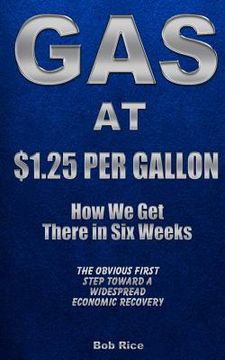Reseña del libro "Gas at $1.25 Per Gallon: How We Get There in Six Weeks (en Inglés)"
In the 240-page book, Gas at $1.25 per Gallon, How We Get There in Six Weeks, I describe 3 important approaches to potentially bring down the price of fuel dramatically. However, the most important approach does not require that you necessarily read the book. Rather all that is required is for you to read and understand this description page and then pick up the telephone. This approach promotes a Congressional ban (not better regulation) of the controversial practice of crude oil speculation. Here is a brief summary of the situation: The so-called crude oil futures and swaps market substantially determines the daily price of crude oil, which then quickly impacts fuel prices worldwide. Higher crude oil prices eventually lead to higher fuel prices. Until early this century, the vast majority of participants in the "crude oil futures market" were so-called "commercial buyers" and "commercial sellers". These individuals stood ready to actually make or receive physical delivery of crude oil. For many years they accurately established daily prices for crude oil based on supply and demand fundamentals. However, bowing to pressure from "big time" political donors in the financial sector, Congress amazingly enough in December of 2000 passed and President Clinton signed into law legislation which made it easier and "safer" for speculators to buy and sell crude oil futures and over the counter swaps type contracts. Now speculators far, far outnumber traditional commercial buyers and commercial sellers of such contracts, and thus speculators are now able to establish the daily ever-changing price of crude oil. Speculators differ from traditional "commercial buyers" or "commercial sellers" of crude oil contracts in that they typically cannot make or receive physical delivery of crude oil. Rather, speculators from Wall Street, London, etc. for example, buy crude oil futures contracts at current prices and hope to sell them later at a profit. During the past 20 years when gas prices spiked substantially, Congress halfheartedly considered ways to better regulate speculation, deferring such action to the "slow motion agency" known as the Commodity Futures Trading Commission. However, "better regulating" speculation is complex and produces difficult to monitor grey areas. In addition, the debate over the potential negative impact of speculators in the crude oil markets could go on forever. Not surprisingly, speculators deny that their dominance in today's crude oil markets causes artificial increases in crude oil prices. They simply smile and say in effect that there is no "absolute proof" of their negative impact. My suggestion is for Congress to forget "better regulating" and instead impose a complete ban (at least temporarily) of American speculation in the crude oil futures markets. Period. If you cannot make or receive physical delivery of crude oil, then you cannot buy or sell crude oil futures contracts. Then sit back and see what happens. The price of crude oil during the next several months, if indeed speculators are the problem, could fall to perhaps as low as $40 per barrel (gas maybe to $1.75) in the absence of speculator-controlled markets. The so called "absolute proof" demanded by speculators and their favorite politicians would be at hand. However, from personal experience, I can say that currently there is zero chance that Congress will pass the proposed ban discussed above. Only if you, the reader, call your political representatives in Washington, your favorite talk show host and other media types and in essence shine a spotlight on the absurd way that politicians have allowed crude oil prices to be determined during the past 20 years, will the status quo change. Publicity is huge. With a dangerous war in progress and with near record high fuel prices, such a time as this would seem a perfect opportunity to publicize and then enact a complete ban (at least temporarily) on crude oil speculation.

